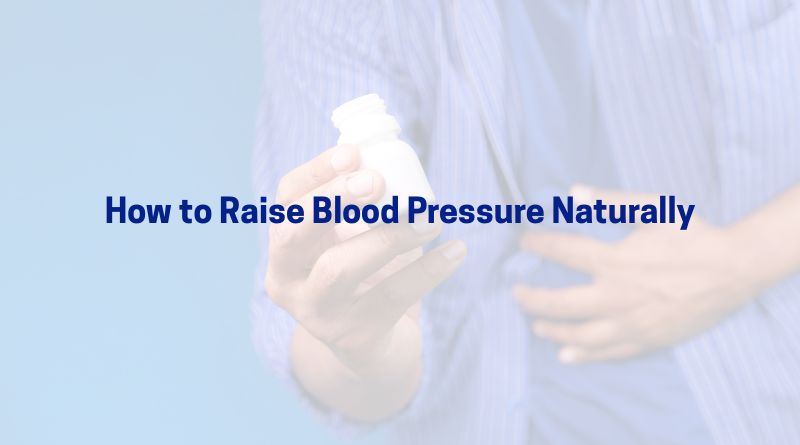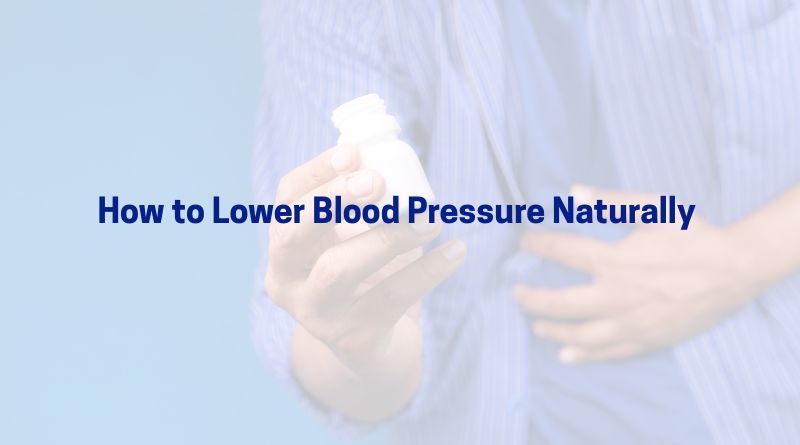How to Raise Blood Pressure Naturally


Low blood pressure (hypotension) can cause dizziness, fatigue, blurred vision, and fainting. While it’s often less talked about than high blood pressure, raising your blood pressure naturally is crucial if it’s too low. In this blog, we’ll explore safe and effective ways to manage low blood pressure at home, using simple lifestyle changes.
What Are the Symptoms of Low Blood Pressure?
Before trying to raise your blood pressure, it's important to recognize if it's too low. Common symptoms of low blood pressure include:
- Light-headedness or dizziness
- Blurred vision
- Weakness or fatigue
- Nausea
- Fainting spells
- Cold, clammy skin
If you experience these frequently, it's essential to talk to a doctor and make necessary lifestyle changes to improve your blood flow and energy levels.
How Can You Raise Your Blood Pressure Naturally Through Diet?
One of the easiest ways to raise low blood pressure is by adjusting your diet. Here’s how:
- Increase salt intake (in moderation): Sodium helps retain fluids and raises blood pressure.
- Stay hydrated: Dehydration reduces blood volume, leading to lower pressure. Drink at least 8–10 glasses of water daily.
- Eat small, frequent meals: Large meals can trigger a sudden drop in pressure after eating.
- Consume nutrient-rich foods like leafy greens, eggs, dairy, lean meats, and whole grains to support your cardiovascular system.
Can More Fluids Help Raise Blood Pressure Naturally?
Yes, staying hydrated is one of the simplest natural ways to raise blood pressure. Water boosts blood volume and prevents dehydration, a key cause of low blood pressure. You can also include:
- Electrolyte-rich drinks (like coconut water)
- Clear soups or broths
- Diluted fruit juices
Avoid alcohol and caffeine in excess, as they can dehydrate your body or trigger spikes and drops in pressure.
Does Posture and Movement Affect Blood Pressure Naturally?
Absolutely. Your body position and movement patterns can greatly affect your blood pressure. Try the following:
- Avoid sudden changes in position: Standing up too quickly can cause a sudden pressure drop.
- Sit or lie down during dizzy spells: Elevating your legs can help blood return to the heart.
- Crossing your legs while sitting can temporarily increase blood pressure.
- Regular stretching and light activity also help improve circulation.
Can Exercise Raise Blood Pressure Naturally?
Yes, moderate exercise supports healthy blood pressure. While intense workouts may lower it temporarily, regular physical activity boosts overall cardiovascular health. Ideal activities include:
- Brisk walking
- Yoga or stretching routines
- Light strength training
- Cycling or swimming
Note: Avoid overexertion if you already experience symptoms of hypotension.
Are There Natural Supplements That Support Healthy Blood Pressure?
Some nutrients can naturally support your blood pressure levels. While you should always consult a doctor before starting supplements, key nutrients include:
- Vitamin B12: Supports nerve and blood cell health.
- Iron: Prevents anemia, which can lower blood pressure.
- Folic Acid: Helps your body produce healthy red blood cells.
- Vitamin C and E: Support blood vessel flexibility.
These can be consumed through a balanced diet rich in fruits, vegetables, and proteins.
How Does Stress Impact Blood Pressure and What Can You Do?
Chronic stress or anxiety can also cause low blood pressure. To manage this:
- Practice deep breathing or meditation
- Get enough quality sleep
- Avoid skipping meals
- Build a daily routine that includes downtime and physical activity
Managing emotional health is just as important as physical health when dealing with blood pressure.
What Lifestyle Habits Should You Avoid to Raise Blood Pressure Naturally?
Certain habits may worsen low blood pressure symptoms. Avoid the following:
- Skipping meals
- Prolonged standing without movement
- Excess alcohol or caffeine
- Overexertion during workouts
Instead, focus on balanced routines, hydration, and regular meals to stabilize your blood pressure levels over time.
Frequently Asked Questions
Q. What is considered dangerously low blood pressure?
A reading below 90/60 mmHg is generally considered low and may require medical attention.
Q. Can low blood pressure cause fatigue and dizziness?
Yes, these are common symptoms of hypotension, especially when standing up or after meals.
Q. Is coffee good for raising blood pressure naturally?
Caffeine can temporarily raise blood pressure but isn’t a long-term fix.
Q. Can low blood pressure be a sign of an underlying condition?
Yes, it can be related to dehydration, anemia, hormonal imbalance, or heart issues. A doctor can help diagnose the cause.
Q. How fast can you raise blood pressure naturally?
You may notice improvement within a few days of adjusting your diet, hydration, and lifestyle habits, but consistency is key.
Conclusion
Managing low blood pressure naturally is possible with consistent lifestyle changes. From staying hydrated and eating smaller meals to regular light exercise and stress reduction, there are multiple ways to support healthy blood flow without medication. If symptoms continue, consult a doctor. Your well-being depends on maintaining a balanced, healthy routine that works for your body.







 Added!
Added!